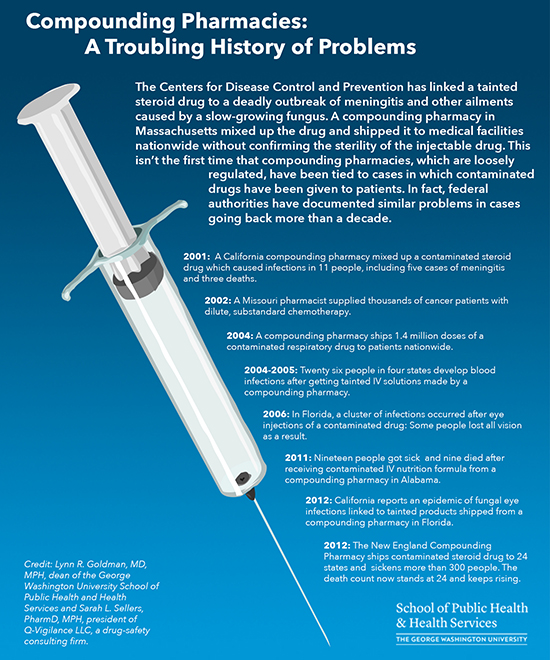
House and Senate lawmakers will hold the first hearings this week to investigate the deadly outbreak of meningitis in the United States.
Those hearings represent a step in the right direction, but Congress must follow up with legislative action -- or run the risk that this outbreak will be followed by others. The U.S. Centers for Disease Control and Prevention (CDC) has reported more than 420 cases of meningitis and the death toll now stands at 32 and rising. Federal investigators have linked the meningitis cases to contaminated vials of steroid drugs made by the New England Compounding Center in Massachusetts.
Even worse, the CDC now says that some meningitis patients have now come down with risky secondary infections that are proving difficult to treat.
A recent op-ed I authored last month along with drug safety expert Sarah L. Sellers argues that the U.S. Food and Drug Administration (FDA) must be given greater regulatory authority over compounding pharmacies like the one at the center of this investigation.
That piece, which was published by the McClatchy national news service and newspapers across the country, says: "The time has come to rein in an industry that has flourished in recent years, selling not only substandard drugs and tainted medicines but also unapproved substances that represent little more than a modern day equivalent to snake oil."
Why do I believe that we must take steps now to closely regulate this industry at the federal level?
Compounding pharmacies have grown in recent years and often operate as factories -- mixing up and shipping out large amounts of drug across state lines. Traditionally they made small batches of tailor-made medicine and thus typically were scrutinized by state pharmacy boards. But without a mandate to meet FDA safe manufacturing standards, they can cut corners. And in fact, that is just what happened in this case, a problem that had tragic results for many families across the country.
The New England Compounding Center made up batches of a steroid drug used to treat back and joint pain, but did so under unsanitary conditions. In fact, inspections by health officials found visible signs of mold, unsterile conditions and standing water at the facility -- which has been shut down since the outbreak came to light.
Instead of producing small amounts of drug for individual patients, this company acted like a large drug firm, but still was able to evade FDA standards. In the end, health officials say that contaminated vials of this injectable pain medication reached an estimated 14,000 patients in 23 states.
Furthermore, this isn't the first such outbreak. Federal health officials have fingered compounding pharmacies in cases that go back more than a decade and involve drugs that are injected into a variety of body areas including the spinal cord, bloodstream and eye. Those tainted drugs have caused outbreaks of illness, loss of vision and deaths -- yet they are quickly forgotten until the next outbreak occurs.
If we do nothing to close the loophole that allows large-scale compounding pharmacies to escape scrutiny by the FDA, such cases will continue to occur. But lawmakers investigating the outbreak this week in Washington can do more than just listen to testimony: They must move now to strengthen the FDA's ability to regulate compounding pharmacies.
Congress should ask the FDA to establish national standards for compounding pharmacies. And compounding pharmacies that cannot meet safety standards might need to be stopped completely. In addition, states need to be actively involved as strong partners in the oversight of this industry.
And just like big drug companies, compounding pharmacies must start reporting adverse events to state and federal authorities. Without such a requirement, a pharmacy that makes up a bad batch of drug can potentially sicken many patients before a cluster is identified and the outbreak comes under investigation.
Drugs made by compounding pharmacies must be clearly labeled so that physicians and patients know they are buying such products -- and can discuss the risks and benefits. Finally, compounding pharmacies must be held responsible for the quality of their products.
I can't even imagine the nightmare this episode has been for the victims and their families. Americans need the government to act and Congress must start crafting solutions today to protect the public from this threat.

For more by Lynn R. Goldman, click here.
For more healthy living health news, click here.